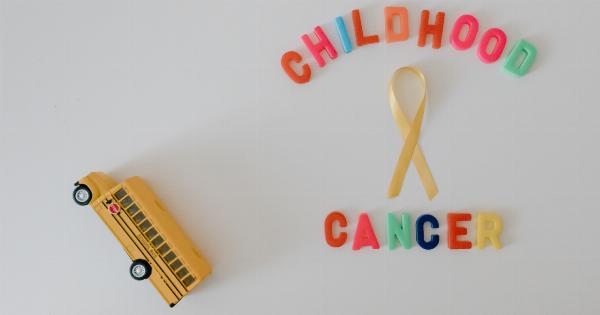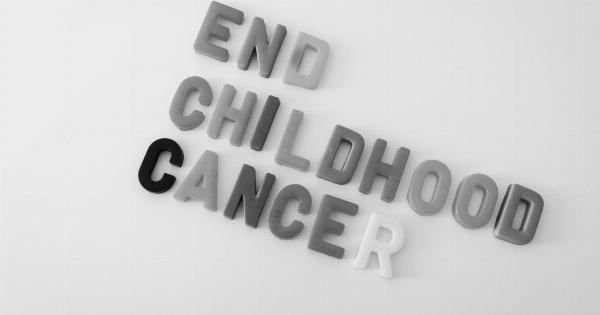Cancer is a devastating disease that can affect individuals of all ages, including children. While pediatric cancer is relatively rare, it is essential for parents to be aware of potential warning signs that could indicate a problem.
Early detection and timely treatment greatly improve the chances of a successful outcome. In this article, we will discuss several key warning signs that parents should be mindful of when it comes to childhood cancer.
Understanding Childhood Cancer
Childhood cancer refers to cancer that develops in children and adolescents. Unlike adult cancer, pediatric cancer often involves different types of cancer and may necessitate different treatment approaches.
Common types of childhood cancer include leukemia, brain tumors, lymphoma, neuroblastoma, and Wilms tumor, among others.
According to the American Cancer Society, childhood cancer is relatively rare, accounting for less than 1% of all cancers diagnosed each year.
However, it remains a leading cause of death in children, highlighting the importance of early detection and treatment.
10 Warning Signs of Childhood Cancer
While the following symptoms may not always indicate cancer, it is crucial for parents to pay attention to any persistent or concerning changes in their child’s health.
If any of these warning signs are present, it is advisable to consult a healthcare professional for a thorough evaluation.
1. Unexplained Weight Loss
If a child is losing weight without any apparent reason, this may be cause for concern. Sudden or significant weight loss could indicate an underlying health issue, including cancer.
It is important to note that weight loss alone is not always indicative of cancer, as it can be caused by various factors. Nevertheless, it should be investigated if it is persistent and unexplained.
2. Fatigue and Weakness
While fatigue and weakness can be common in children, persistent exhaustion or a sudden, unexplained lack of energy could be a sign of something more serious. Cancer can often cause a child to feel constantly tired and lacking in strength.
If a child’s energy levels significantly decrease over an extended period, medical attention is warranted.
3. Persistent Pain
Persistent or recurring pain in any part of the body should not be ignored. While pain can be caused by many non-cancerous conditions, it is essential to have a healthcare professional evaluate any ongoing discomfort.
Headaches, back pain, bone pain, and abdominal pain are some examples of potential warning signs that should be investigated.
4. Unusual Lumps or Swellings
Finding a lump or swelling in a child’s body can be alarming. Although many lumps are benign and unrelated to cancer, it is crucial to have them examined.
Unexplained lumps, especially if they are growing or accompanied by other symptoms, warrant medical evaluation.
5. Persistent Fever
A fever lasting more than a few days without any obvious cause should not be ignored.
While fevers are generally a sign of the body fighting an infection, persistent or recurrent fevers could indicate an underlying condition, including certain types of cancer. A healthcare professional should evaluate prolonged or recurrent fever in children.
6. Excessive Bruising or Bleeding
If a child experiences frequent or unexplained bruising or bleeding, it is essential to consult a healthcare professional.
While bruising easily can have simple explanations, such as rough play, persistent or excessive bruising without apparent cause can be a sign of an underlying health issue, including certain types of cancer or blood disorders.
7. Changes in Vision
Changes in a child’s vision, such as blurred vision or the presence of white spots in the pupil, should be promptly assessed. In certain cases, these changes may indicate eye cancer, such as retinoblastoma.
Immediate medical attention should be sought if there are any concerns regarding a child’s eyesight.
8. Sudden Changes in Balance or Coordination
While clumsiness is quite common in young children, significant and sudden changes in balance or coordination should not be ignored. Coordination difficulties could be a symptom of brain tumors or certain types of cancer affecting the nervous system.
It is crucial to discuss any concerns related to balance and coordination with a healthcare professional.
9. Recurring Infections
If a child consistently experiences infections, such as ear infections, respiratory infections, or urinary tract infections, it may be worth discussing with a healthcare professional.
While recurring infections are often part of childhood, frequent or severe infections can sometimes be associated with certain types of cancer.
10. Changes in Appetite
Significant changes in a child’s appetite, such as a sudden increase or decrease in food intake, should be monitored closely.
While appetite changes can be due to various factors, unexplained and persistent changes could be a sign of an underlying health condition, including cancer.
Conclusion
It is important for parents to educate themselves about the warning signs of childhood cancer. Remember that these signs are not exclusive to cancer and can be caused by other conditions as well.
However, if any of these warning signs persist or cause concern, it is crucial to consult a healthcare professional for a comprehensive evaluation. Early detection and prompt treatment play a vital role in improving the chances of a positive outcome for children with cancer.























